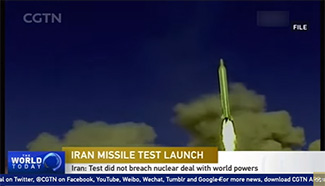by Peter Mertz
LOS ANGELES, Feb. 3 (Xinhua) -- The U.S. coal industry on Thursday hailed the first of President Donald Trump's three expected regulation rollbacks affecting the energy sector.
The U.S. Senate voted 54-45 on Thursday to repeal the "Stream Protection Rule," which was ordered by former President Barack Obama in December 2016 that coal industry officials said was simply excessive.
The Interior Department had said Obama's measure would protect 6,000 miles (9,600 km) of streams and 52,000 acres (20,800 hectares) of forests by keeping coal-mining debris away from nearby waters.
"It was midnight legislation, redundant and unnecessary," Chris Warren from the Institute for Energy Research, told Xinhua.
"Don't understate overreaching regulations -- they have hurt the coal industry significantly," Warren said, noting that coal supplies more than half of the electricity in the nation.
A number of coal-burning power plants were scheduled to close in 2017, due to the excessive regulation, said Warren, whose institute is a pro-energy think tank based in Washington, D.C.
"These overreaching regulations imposed by President Obama in his final months really hurt the coal industry," Wyoming Mining Association Director Travis Dita told Xinhua.
But industry outsiders disagreed.
"They (The jobs) were being phased out anyway," said David B. Richardson, a Seattle attorney and a Washington political insider.
"Natural gas is much cleaner and less damaging to the environment, plus renewable energy is taking an increasing share of the market."
Wyoming, the largest producer of coal in the United States since 1986, had 38,500 employed in the coal industry in 1982, but only 7,000 in 2011. A drop in natural gas prices lowered electricity use and slowed coal production.
Richardson warned that Trump is trying to revive a fading industry that employs few people and does irreparable damage to the Earth.
"This is just the beginning," Richardson said.
Indeed, the order reversed Thursday is just the first of three quick moves anticipated by America's new anti-regulation president.
Energy insiders in Washington, D.C. told Xinhua that the next two moves by Trump will be to relax carbon dioxide emissions from power plants, and to lift a moratorium on leases for oil and gas exploration on federal land.
These two initiatives will save the industry billions of dollars in regulation costs and leasing expenses, oil industry executives said.
The three imminent reversals could take from months to years to be realized, mining officials told Xinhua.
The Environmental Protection Agency (EPA) declined to comment on this issue.
On Wednesday, the vote to approve Trump's new EPA chief was delayed.
Senate Democrats boycotted the nomination of Scott Pruitt, a pro-oil and gas conservative, who doubts the science of climate change.
Maryland Senator Ben Cardin, a Democrat, said he could not support Pruitt for a public health position because he "denies the sum of empirical science and the urgency to act on climate change."
The Stream Protection Rule was the first regulation repealed in U.S. history, under the recently enacted Congressional Review Act which allows lawmakers to overturn regulations with a simple majority.














